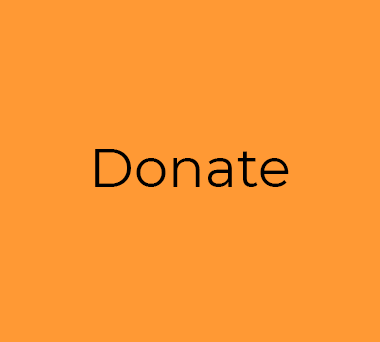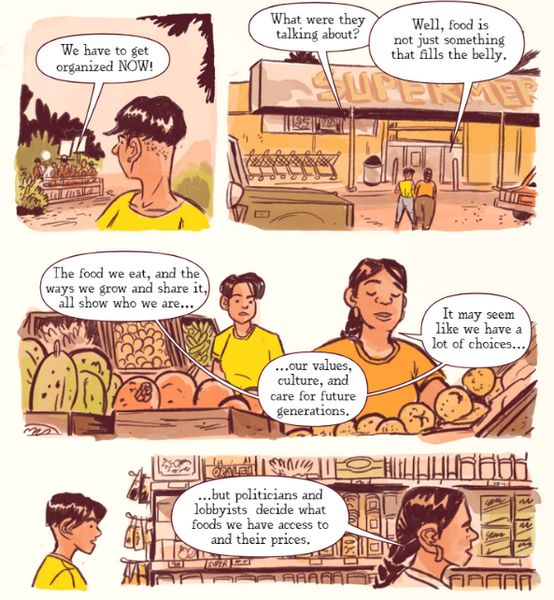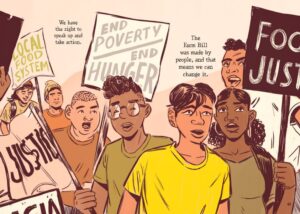Storytelling for Change
At La Semilla Food Center, we view the act of storytelling as a vehicle for change that works to shift power, uplift inherently healthy food traditions and practices, and increase connection to the Chihuahuan Desert ecosystem. While we have been cultivating culture and telling stories since our inception, in the past couple of years, La Semilla has laid the groundwork for an organizational approach to storytelling and cultural strategy. Thus, our Storytelling Department was born. Within our vision for a vibrant, local food system that prioritizes community and environmental health, we work to gather, craft, and center stories that come directly from the lived experiences and wisdom of the folks in our community. In this work, we also strive to challenge and transform dominant narratives about our communities, desert ecosystem, and border region. We do all of this through respectful and relational storytelling efforts via the written word and visual storytelling methods. In this work, we aim to understand our literal place in the world, name and reconcile past harms, and channel resources to support the continued creation of life-affirming food systems.
In recent years, we have created and supported a visual culture that reflects this commitment. Our Policy and Storytelling staff worked with illustrator and long-time friend to La Semilla Zeke Peña in the creation of a graphic zine titled Food, Land, and Us: A Look at the Farm Bill from the Paso del Norte Region. Food, Land, and Us illustrates the history of the Farm Bill in U.S. agricultural policy and the impact this policy has on our communities today.
Excerpts from Food, Land, and Us (2021)
Over two years in the making, the zine is a testament to storytelling and art for change. The zine is available to view for free and to purchase in digital and printed formats (in both English and Spanish) in our shop. You can also view a recording of the virtual release La Semilla hosted in August of 2021 featuring the creators of Food, Land, and Us and a panel of food justice advocates from other regions. Read more about the zine’s role as an educational tool here.
In 2021, La Semilla supported the creation of two new, beautiful murals that are both visible in public and educational spaces. Inspired by story-gathering sessions with participants from across our region in October of 2020, two El Paso-based artists painted murals reflecting local foodways, histories, and stories of resilience during the ongoing COVID-19 pandemic. Diné artist Al Woody painted a mural titled Life Origins that is featured prominently at Bowie High School in El Paso, TX. You can read more about his background and process as an artist here. Christin Apodaca painted a mural titled Long Roots, Long Lives at La Semilla Community Farm in Anthony, NM.
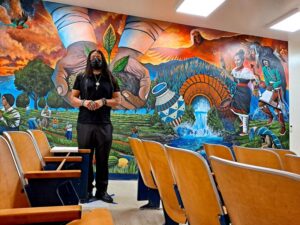
Al Woody during the virtual unveiling of Life Origins at Bowie High School in El Paso, TX
(Photo by Michelle E. Carreon)
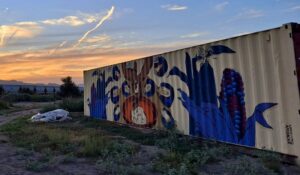
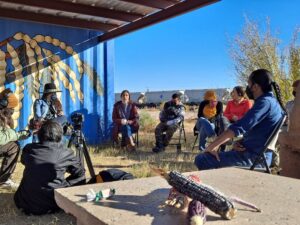 |
|
Photos of one side of Apodaca’s mural (top) and community dialogue with the artist and Chef Mateo Herrera
during the virtual release. (2021)
(Photos by Michelle E. Carreon)
We continue to cultivate and support this work in various ways, including a new cultural fellowship that supports local cultural heritage and food justice practitioners in meaningful ways.
Cultural practice is an ongoing and ever-evolving process. We make culture by living culture. In our creative process, we look to our past and learn from those who came before us because we cannot know where we are going without knowing where we have been. We live in the present while always looking towards the future and those who will lead after us.
What does cultural practice look like for you? What are you already doing to connect to our regional culture? It’s ok if you may not already know the answers to these questions. Many of us at La Semilla are still finding our way and developing our own cultural practice as we go.
It’s through the process and act of humility that we continue to learn and evolve.
We invite you to learn with us and expand these relationships with each other and with the Chihuahuan Desert ecosystem we inhabit. In this sharing and collaborative learning, we can continue to develop and expand on our collective cultural practices while acknowledging what we all bring to the table.
Your practice, whatever it is, matters, and your stories matter. Our stories matter….and they will continue to spread like wildfire.

